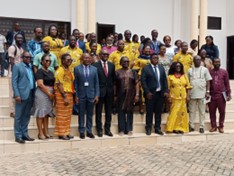The Institute of Statistical, Social, and Economic Research (ISSER) of the University of Ghana has revealed that over 36 percent of rural dwellers still depend on unsafe, limited and unimproved sources of drinking water.
This is according to the research body’s newly launched Ghana Social Development Outlook (GSDO) 2022, a bi-annual report. Though it said access to improved drinking water increased by 10 percentage points between 2018 and 2021 – with sachet-water being the major source with 37.4 percent followed by pipe-borne water at 31.7 percent, it added that both sources seem to be unobtainable for rural dwellers.
The report noted that access to improved drinking water seems to be a bigger challenge for people in northern parts of the country. In the North-East Region, for instance, two percent of urban dwellers numbering about 400,000 people lack access to improved water; while 17 percent of rural dwellers in the Savannah Region also lack safe drinking water.
“Water accessibility rates were low in regions like Savannah, North-East, and Oti. The access rate for rural dwellers is 74.4 percent and for urban dwellers 96.4 percent; but much lower for North-East at 54.8 percent and Savannah at 55.1 percent,” GSDO noted.
Head of Social Division, ISSER, Dr. Martha Awo, proffering a solution to the situation emphasised the need for government to collaborate with non-governmental organisations (NGOs) and development partners that are involved in water and sanitation-related ecosystem advancement, especially borehole construction for communities, to alleviate their plight.
“To bridge this gap, government must collaborate with NGOs and development partners; because sometimes they construct these mechanised boreholes and other facilities for the people to grant access to water, but when the project is done and the system develops faults maintenance becomes a challenge; hence, government must work hand-in-hand to provide a holistic solution,” she said.
She added that the NGOs are partners to promote and assist government in doing its work, but not to take over the mandate of government. Therefore, government must not leave its responsibility to augmenting partners but rather take charge and lead.
Director of ISSER Prof. Peter Quartey, on his part, provided a general overview of the GSDO which focused on all aspects of social wellness – including health, sanitation, agriculture, employment, education and population among others.
“In the areas of education, health and housing, we have seen some challenges. We are doing better as a country in some areas than others, and so this is a call on all stakeholders to address some of the issues revealed for the general good of society.
“It is our hope that GSDO 2022 will contribute to the progress of social development of government and its agencies, and serve as a useful source of data and material for discussion and further enquiry for academia and the general public,” he said.
Only 59% of households have toilet facilities
In the area of sanitation, it was disclosed that 59.3 percent of households in the country have toilet facilities. The breakdown shows that 65.9 percent of households in urban areas have toilet facilities while rural only 49.1 percent of households boast lavatories. Regions with higher urban open-defecation include the North-East, Savannah, Northern, Upper East, and Oti Regions.
On the policy front, the report recommended implementing targetted programmes and initiatives to provide improved toilet facilities, increase investment in infrastructure, and expand water supply networks to households across the country.










